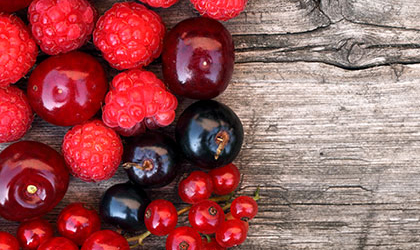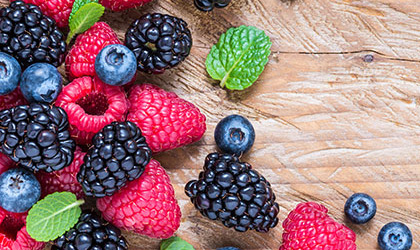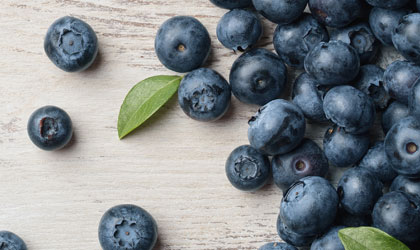
Your liver filters each and everything you consume. It knows when you’ve indulged in that afternoon chocolate bar, sipped on an ice-cold beer, or started a course of antibiotics. Nothing bypasses it. It comes as no surprise, then, that fine-tuning your diet is one of the best weapons in your liver health arsenal. We’ve already outlined some of the top foods to nourish your liver, but you’ll be pleased to know there’s even more goodness to cram into your diet.
Grapes
Not simply reserved for munching when you’re sick, grapes are chock-full of nourishment for your liver. Dark red or purple grapes, in particular, are powerhouses for this major organ, thanks to their rich antioxidant content. These juicy jewels are jam-packed with potent antioxidants. Chowing down on whole, seeded grapes is the best way to quite literally reap their fruits. Add these beauties to salads, desserts, or pair them with cheese.
Almonds
On the hunt for a snack that’s guilt-free and loves your liver? Look no further than the humble almond. These sweet, creamy nuts aren’t just delicious; they’re also packed with vitamin E, which excels in liver health. Vitamin E is a powerful antioxidant, combatting free radicals and safeguarding the liver from toxins. In a six-month observational study on individuals a liver condition, researchers found participants who regularly grazed on nuts, like almonds, had improved liver enzymesi. Be sure to keep a packet of these nutritious nuts stashed in your office drawer when the afternoon slump strikes.
Lemons
Kick-starting your day with the famous lemon water combination has won wide acceptance by the wellness community. But why is it so lauded? This zesty, zingy fruit rich in vitamin C, which helps to defend it against free radical scavengers. That’s not all; lemons also deliver a strong hit of naringenin – a powerful compound that may support liver healthii. So, if you’ve dismissed the lemon and water as a fad, perhaps it’s time for round two? Plus, it’s a great way to stay hydrated and support the liver at the same time.
Blueberries
When it comes to supplying a ton of antioxidant goodness, nothing quite beats the blueberry. These blue jewels may be small in size, but trust us when we say they’re big in nutritional value. Blueberries are bursting with anthocyanidins – potent antioxidants that give the berries their distinctive hue. A growing raft of data suggests these powerhouses help support our immune systemiii. Try eating just 3-4 portions every week. And there’s really no excuse not to be munching more of them because blueberries are brilliantly versatile: add a handful to your bowl of Greek yoghurt; toss them through a salad; or blitz in a juice. Not berry season? Fear not: go frozen. They will still contain plenty of nourishment – promise!
Dark leafy greens
Your parents were right when they told you to pile your plate high with greens. Dark leafy greens, like kale, spinach, rocket, and Swiss chard, are teeming with vitamins, minerals, and antioxidants. Take chlorophyll, for instance. This compound gives green leafy veggies their famous green pigment. From sautéing to roasting to juicing, you can get your green fix in a variety of delectable ways.
Brussels sprouts
Brussels sprouts are more than just a Christmas staple. In fact, these green guys should be on the menu all-year around quite simply because they’re so darn good for us. For many areas of health. Similar to broccoli, brussels are crammed with soluble fibre, vitamin C, and antioxidants, making them a powerful food to support a healthy liver. Many people turn their noses up to Brussels because of their alleged ‘bitterness’. To tone this down and bring out their wonderful sweetness, we’d suggest roasting your sprouts instead of steaming. Simply drizzle them with olive oil, salt, pepper, and roast for 30-40 minutes. Et voila: caramelized, crispy sprouts that everyone will want to help themselves to. Just you watch.
Papaya
Long associated with summer, papayas are widely touted for their mouthwatering sweetness and creaminess. Beyond being a dazzling addition to any fruit salad, papaya is a rich source of the mighty antioxidant, vitamin C, which helps to combat free radical damage. In addition to this, papaya also contains the compound, pyrroloquinoline quinone (PQQ) – another powerful antioxidant, which may play a role in liver healthiv. Papayas come in all kinds of shapes and sizes: all are delicious; all are brimming with liver loving antioxidants. You’ll know if a papaya is ripe because the skin will turn from green to yellow. The beauty of this fruit is its versatility: serve in salads, make into chutney, or cook them! Learn more about the powerful effects of antioxidants on heart health here and brain health here.
Artichokes (Globe)
Trust us when we say it’s well-worth fighting your way through an artichoke’s spikey exterior to get to all its goodness. Packed with a herculean amount of fibre and antioxidants, this vegetable has truly earned its place on this list of liver loving foods. Do any search online and artichoke will come up as a superhero! Try rustling up an artichoke soup, salad, or roast them to unlock the full-spectrum of their stunning flavours.
References:
-
Gupta. V. (2015). Oily fish, coffee and walnuts: Dietary treatment for nonalcoholic fatty liver disease. World Journal of Gastroenterology. 21(37), 10621.
-
Hernández-Aquino. E. & Muriel. P. (2018). Beneficial effects of naringenin in liver diseases: Molecular mechanisms. World journal of gastroenterology. 24(16), 1679–1707.
-
Available online: https://www.theguardian.com/lifeandstyle/2018/mar/19/is-your-gut-keeping-you-awake-at-night
-
Madrigal-Santillán. E. (2014). Review of natural products with hepatoprotective effects. World Journal of Gastroenterology. 20(40), 14787.
-
Woelk. H., Schlafke. S. A multi-center, double-blind, randomised study of the Lavender oil preparation Silexan in comparison to Lorazepam for generalized anxiety disorder.
-
ScienceDaily. (2019). Common antioxidant may guard against liver disease: PQQ is found in kiwi fruit, soy and celery. Available online: https://www.sciencedaily.com/releases/2017/01/170103122310.htm [Accessed 17 May 2019].
You Might Also Like

Keri
Keri Filtness has worked in the Nutrition Industry for 19 years. She is regularly called upon for her professional comments on health and nutrition related news. Her opinions have been featured by BBC3, Prima, Vitality, The Mirror, Woman’s Own and Cycling Weekly, amongst others. She has also worked one to one with journalists, analysing their diets and health concerns and recommending changes and additions, where appropriate.
View More



